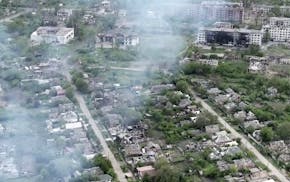In the early 1990s, Jonathan Franzen and David Foster Wallace -- two of recent history's most influential American novelists -- agreed that fiction was a "neutral middle ground on which to make a deep connection with another human being," and that writing and reading literature were "a way out of loneliness."
Franzen's eulogy for Wallace -- whose 2008 suicide ended the life of "as passionate and precise a punctuator of prose as has ever walked this earth" -- is anthologized in his latest collected nonfiction and depicts pain born from love. Throughout the book, Franzen suggests that storytelling is a way to interpret and relieve our collective suffering -- a vehicle for social connection -- and that apathy can be challenged with Molotov cocktails of "bottomless empathy, born out of the heart's revelation that another person is every bit as real as you are."
In "The Ugly Mediterranean," the author of "Freedom" witnesses the slaughter of migratory songbirds in Cyprus. "The Chinese Puffin" navigates assaults to China's environment wrought by industrial progress. "On Autobiographical Fiction" is a searching account of his depression and divorce while writing "The Corrections," the novel for which he received the 2001 National Book Award. In the title essay, he camps on a volcanic island in the South Pacific believed to be the setting for Daniel Defoe's "Robinson Crusoe," wrestling with despair in the aftermath of Wallace's suicide.
Combining personal history with cultural events and the minutiae of daily life, Franzen evokes Joan Didion's tone of rigorous self-examination, and Wallace's wit and philosophical prowess. Whether he is writing about technologies' assault on sincerity or analyzing Alice Munro's short stories, what emerges are works of literary theory and cultural critique that are ambitious, brooding and charmingly funny.
In these essays, Franzen seems always striving to be closer to the source of his obsessions, his pain. He writes, "When you consider the alternative -- an anesthetized dream of self-sufficiency, abetted by technology -- pain emerges as the natural product and natural indicator of being alive in a resistant world."
In "Why Bother?" from 2002's collected essays, "How to Be Alone," Franzen argues that novels shouldn't be expected "to bear the weight of our whole disturbed society," yet wonders, "To write sentences of such authenticity that refuge can be taken in them: Isn't this enough? Isn't it a lot?" The essays in "Farther Away" are rigorous, artful devotions navigating morally complex topics. At the heart of this collection are the ways "engagement with something you love compels you to face up to who you really are." Collectively, they are a source of authenticity and refuge -- a way out of loneliness.
Kathryn Savage's writing has appeared in the Village Voice, Ploughshares blog book reviews and City Pages. She teaches at the Loft.
Sign up for Star Tribune newsletters

Drone footage shows Ukrainian village battered to ruins as residents flee Russian advance
In heated western Minn. GOP congressional primary, outsiders challenging incumbent

